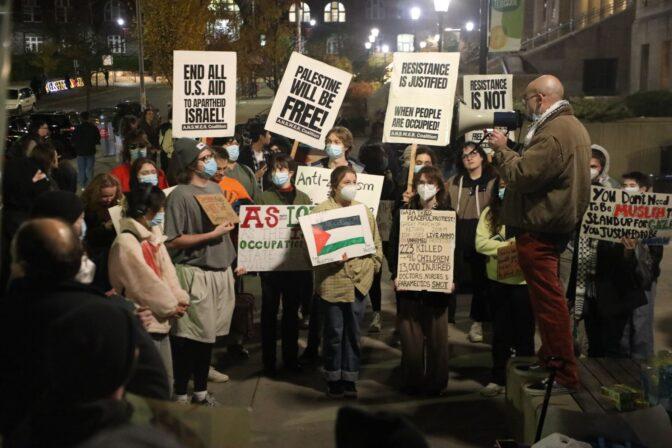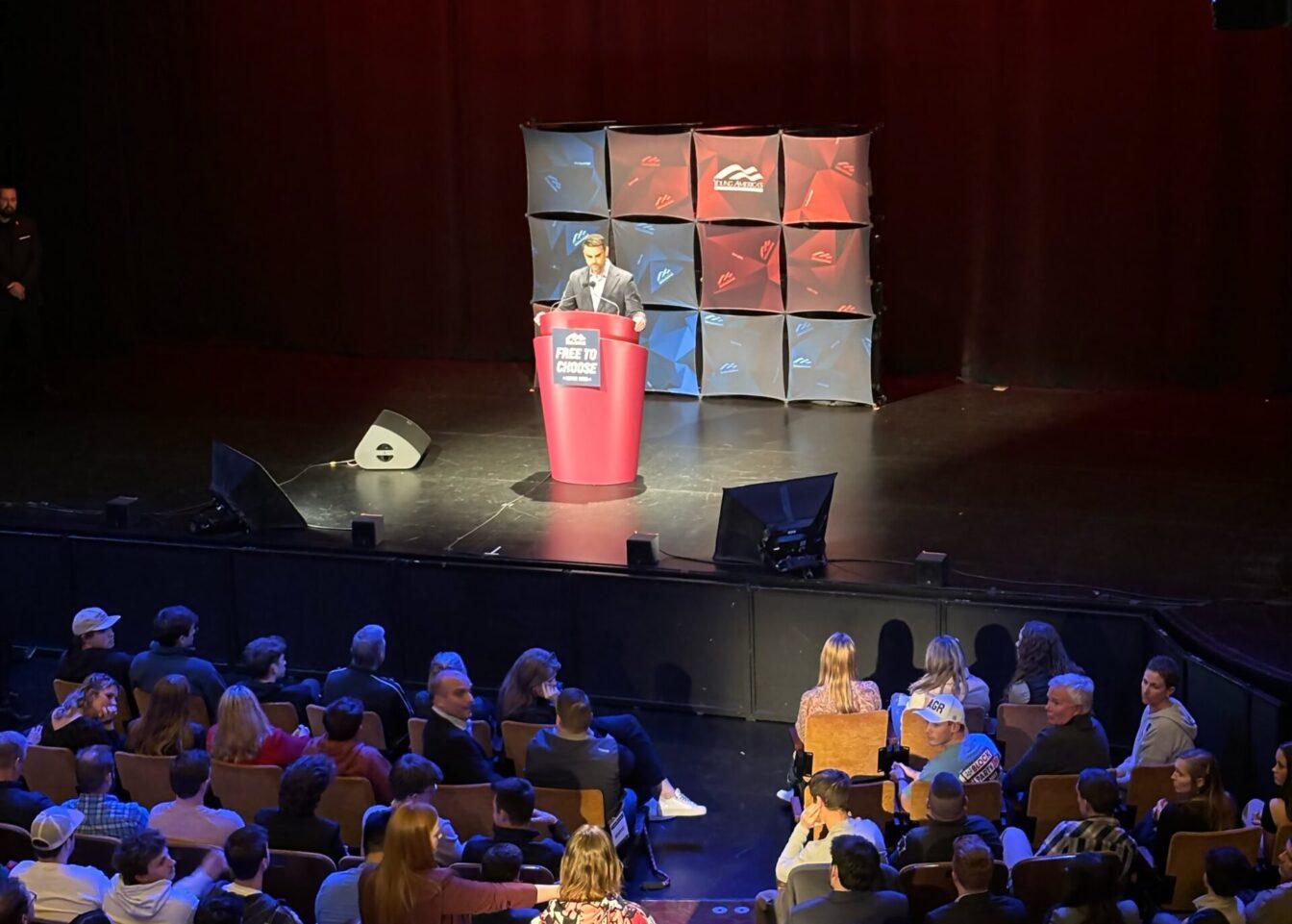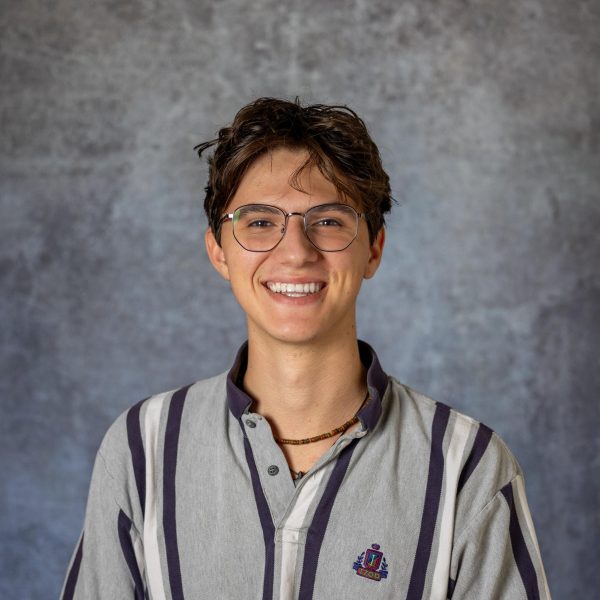Conservative political commentator Ben Shapiro spoke at the University of Wisconsin’s Memorial Union Monday as part of the Young Americans for Freedom’s Free to Choose Lecture Series. Shapiro is co-founder of DailyWire+, a media company which provides counter-cultural news, entertainment and opinion content, and host of The Ben Shapiro Show.
The event, titled “Stop Being Apologetic About the Superiority of Western Values,” took place at Shannon Hall, which seats over 1,000 audience members, and was streamed live on the YAFtv Youtube channel. The event was co-sponsored by YAF, the UW Tommy G. Thompson Center on Public Leadership, GOP Badgers and the UW Center for the Study of Liberal Democracy, according to the event’s posting.

Jacob Duran/The Badger Herald
Shapiro’s lecture drew about 100 counterprotestors outside of Memorial Union before and during the event. The counterprotest, organized by the Young Democratic Socialists of America, showed support for Palestinian people and transgender rights — both of which were topics Shapiro spoke about extensively during the lecture.
YDSA treasurer and protest organizer Nathan, who requested to be identified by first name only for safety reasons, said Monday’s protest was intended to create a safe space for community members impacted negatively by Shapiro’s presence on campus and point them in the direction of solutions to problems in today’s society. YDSA aimed to avoid directly escalating conflicts between individuals during the demonstration, Nathan said.
“Our goal today is to have a space for people to share how they’ve been impacted by the speaker and by right-wing organizations on campus that make them feel unsafe, unheard and who don’t value their lives,” Nathan said.
In a statement published on Red Madison, YDSA said Shapiro’s rhetoric is harmful, and that Shapiro should receive a “decided unwelcome from the solidaric union of university students who instead embrace diversity, equality and justice.”
Shapiro’s lecture began with his thoughts about why “Western civilization is in fact better than its competitors,” and was followed by a question and answer segment.
Shapiro spoke at length about the ongoing Israel-Hamas conflict throughout the event, expressing pro-Israel and anti-Hamas beliefs.
A handful of audience members demonstrated silently in support of Palestinian people, raising their hands, which were painted red. Similar demonstrations have occurred across the nation, including during Secretary of State Antony Blinken’s testimony at a Senate hearing on a package that included aid to Israel Oct. 31, according to CBS News.
He also debated an audience member on his stance that only people assigned female at birth should be considered women.
Later during the Q&A portion of the event, Shapiro discussed who he believes would be the best fit for president ahead of the 2024 election, vouching for Florida Gov. Ron DeSantis or former South Carolina Gov. Nikki Haley. Shapiro also said he hopes former President Donald Trump isn’t the Republican nominee in the upcoming election.
Shapiro, who said he did not vote for Trump in the 2016 presidential election, urged voters to set aside their opinions on the personalities of the candidates and focus on policy instead.
“When it comes to 2024, the bottom line is that the governance strategy of the two sides is very different,” Shapiro said. “Putting aside the personalities … the government strategy is going to be very different and you’re going to have to make a decision as to which way you’d like the United States government.”
Shapiro also spoke on Universities of Wisconsin DEI funding cuts, the future of the Republican party and what he believes could cause partisan unification in the U.S., among other topics.
Protest of speakers at UW
Before the event, rigorous security protocol at Shannon Hall’s entrance included a strict no-bag policy and metal detectors, along with UWPD officers and volunteers handing out flyers detailing UW’s protest and demonstration guidelines.
When the event inside began, UW Dean of Students Christina Olstad reminded attendees of UW’s protest guidelines regarding event interruptions.
“Protests and demonstrations that materially and substantially disrupt the rights of others to engage in or listen to expressive activity shall not be permitted and shall be subject to sanction,” UW’s policy, which was adopted in 2017, reads.
During Shapiro’s last visit to UW in 2016, he was met with protestors who yelled loudly and blocked the stage during the event. Last October, YAF organized conservative political commentator Matt Walsh’s controversial visit to UW, which elicited vandalism and organized protests.
In 2017, UW Regents approved of the policy, hoping it would protect First Amendment expression that could be seen as disagreeable, controversial or even offensive, according to reporting from The Badger Herald. The legislation allows for the expulsion of UW students who are found to be disruptive to others freedom of speech on three occasions.
At the time, students criticized the legislation for being too vague and potentially protecting hate speech on campus.
Shapiro’s 2016 appearance and Walsh’s visit last spring both resulted in statements from UW reinforcing their stance on protecting free speech on campus for both invited speakers and protestors.
Olstad reaffirmed UW’s stance at Monday’s event.
“The University of Wisconsin Madison is committed to freedom of speech and freedom of expression as an essential part of our educational mission,” Olstad said. “We are here tonight to hear the scheduled speaker speak … It is our expectation that you will allow the speaker’s presentation and subsequent question and answer exchanges to occur without disrupting.”
Free speech conflicts persist
While introducing Shapiro to the stage, YAF Chair Harrison Wells said conservative students at UW face discrimination and intimidation on campus, citing a Universities of Wisconsin study which found that conservative students feel disproportionately uncomfortable sharing their beliefs in the classroom.
The study, titled “UW System Student Views on Freedom of Speech,” was distributed to more than 83,000 Universities of Wisconsin students at the end of 2022. The report found that 67% of respondents who identified as Republican reported wanting to, but deciding against, sharing their views on controversial topics in class.
Though creating a welcoming environment for differing opinions in the classroom is considered best practice for instructors, UW First Amendment expert Howard Schweber told The Badger Herald in February that feeling comfortable expressing opinions isn’t guaranteed by free speech protections.
But, ongoing initiatives for students and instructors facilitated by UW aim to foster a welcoming environment for all viewpoints, according to reporting from The Badger Herald. In a news release following the study, UW Chancellor Jennifer Mnookin said maintaining a viewpoint-diverse environment on campus allows students from all backgrounds and beliefs to engage and grow during their time at UW.
Wells said conservative students are yet to feel heard on campus. He said YAF has been forced to move speakers off-campus and that they replace organization flyers daily around campus because they are torn down within hours.
“UW–Madison administration has time and time again claimed to support free speech on this campus, yet we still face the same obstacles year after year,” Wells said. “I hope for the sake of the future and integrity of this university that the administration follows through with their stated commitment.”
Event organizers had not responded to The Badger Herald’s request for comment at the time of this article’s publication.




